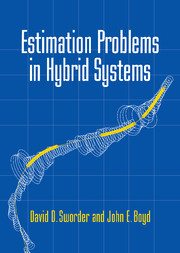Book contents
- Frontmatter
- Contents
- List of Illustrations
- Preface
- 1 Hybrid Estimation
- 2 The Polymorphic Estimator
- 3 Situation Assessment
- 4 Image-Enhanced Target Tracking
- 5 Hybrid Plants with Base-State Discontinuities
- 6 Mode-Dependent Observations
- 7 Control of Hybrid Systems
- 8 Target Recognition and Prediction
- 9 Hybrid Estimation Using Measure Changes
- Appendix 1 PME Derivation Details
- Appendix 2 COM Derivation Details
- Bibliography
- Index
- Glossary
3 - Situation Assessment
Published online by Cambridge University Press: 17 August 2009
- Frontmatter
- Contents
- List of Illustrations
- Preface
- 1 Hybrid Estimation
- 2 The Polymorphic Estimator
- 3 Situation Assessment
- 4 Image-Enhanced Target Tracking
- 5 Hybrid Plants with Base-State Discontinuities
- 6 Mode-Dependent Observations
- 7 Control of Hybrid Systems
- 8 Target Recognition and Prediction
- 9 Hybrid Estimation Using Measure Changes
- Appendix 1 PME Derivation Details
- Appendix 2 COM Derivation Details
- Bibliography
- Index
- Glossary
Summary
Introduction to Situation Assessment
An abridged version of the polymorphic estimator was presented in Chapter 2. The PME is a finite-dimensional algorithm for generating the Gt-conditional mean of the zygostate along with several moments that are interesting in their own right. The plant dynamics of the hybrid system are partitioned into a base-state, modal-state pair, and the observation has a compatible partition. In this chapter we will focus on the modal-state measurement subsystem in which the measurements are discrete.
The specific application to be considered is the study of situation assessment by human decision makers. Many geographically distributed systems include both human decision makers and a diverse collection of sophisticated hardware/software subsystems. With the unavoidable errors and distortions in data accumulation, transfer, and presentation, it is difficult to determine the appropriate human role, or even if the decision maker is properly filling the role given him. Athans referred to decision-making systems as “event driven” and observed that “the state variables…are both continuous and discrete” [Ath87]. In Athans's partitioning of the comprehensive state space, the discrete states represent global (or meta) states that modulate the local (or micro) aspects of the task environment. The decision maker's reaction to local phenomena tends to have a reflexive quality. It is in this reaction to macroevents that particularly human idiosyncrasies are manifest.
A primary task for a decision maker is to identify changing circumstances in an environment characterized by noise and clutter.
- Type
- Chapter
- Information
- Estimation Problems in Hybrid Systems , pp. 56 - 82Publisher: Cambridge University PressPrint publication year: 1999



